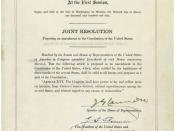As our blueprint for individual freedom and the assurance of an open
society, the First Amendment protects freedom of speech, press,
religion, assembly and petition. Generally speaking, most people
believe in the right to free speech, but debate whether it should cover
flag-burning, hard-core rap and heavy-metal lyrics, tobacco advertising,
hate speech, pornography, nude dancing, solicitation and various forms
of symbolic speech. Many would agree to limit some forms of free
expression.
I chose to analyze an article (by Alan Charles Kors) on free speech,
discussing the first amendment, for speech codes on college campuses. I
recently worked for a college for three years as a Financial Aid
Assistant, aiding families in the federal loan and institutional
application process. The following article analysis not only relates to
what I got to experience in the collegiate environment, it also
reinforces actual rights, and
the struggle for liberty and
equality.
When the U.S. Constitution was signed on Sept.
17, 1787, it did not
contain the indispensable freedoms now delineated in the Bill of Rights,
because many of the Framers viewed their addition as unnecessary.
However, after spirited debate, the Bill of Rights was adopted. The
first freedoms guaranteed in this historic document were articulated in
the 45 words written by James Madison that we have come to know as the
First Amendment.
The First Amendment reads: "Congress shall make no law respecting an
establishment of religion, or prohibiting the free exercise thereof; or
abridging the freedom of speech, or of the press; or the right of the
people peaceably to assemble, and to petition the Government for a
redress of grievances". The First Amendment was established because at
America's inauguration, citizens demanded a promise of their basic
freedoms.
Almost all colleges and universities, for example,? have "harassment"
policies that prohibit selective...


